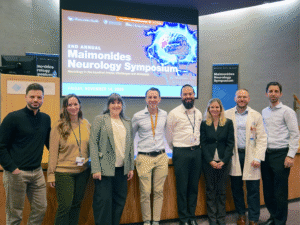Maimonides Neurosciences Institute is proud to offer a complete range of treatment options for various neurological conditions, including the latest medications and procedures. Now, neurology specialists at Maimonides are making a groundbreaking new treatment available for patients with Alzheimer’s disease.
Lecanemab is the first amyloid beta-directed antibody approved by the FDA, with proven efficacy in slowing cognitive decline and disease progression in Alzheimer’s patients.
“Alzheimer’s disease is a devastating disorder, and we’ve never before had a drug that slows it down,” says Steven Sparr, MD, a neurology specialist at Maimonides. “Some drugs provided symptomatic relief of memory problems, but did not slow progression of the disease. Now we finally have a drug that can actually slow the deterioration that Alzheimer’s causes.”
High-Level Coordination for Complex Care
Lecanemab’s primary benefit is its ability to increase quality years of life for patients living with Alzheimer’s. This means greater independence and more time with family and loved ones. The process to get each patient on the medication can be lengthy, but the importance of making this drug more accessible to Alzheimer’s patients cannot be overstated.
“With the initial testing necessary to safely get patients on this medication, it has to be a very well-coordinated effort to get through the process of evaluation,” said Dr. Sparr. “It’s a long process, but we feel our patients deserve access to this transformative treatment.”
First, patients must be thoroughly evaluated for dementia, as the drug is intended for patients with early Alzheimer’s disease and mild cognitive impairment. After that, providers must prove the presence of Alzheimer’s with brain imaging or spinal fluid testing, and rule out other conditions using blood testing or MRI.
Providers then test for the APOE-ε4 gene, which can increase risk of side effects from lecanemab, in the form of amyloid-related imaging abnormalities (1). Often with no obvious symptoms, this condition and its related brain bleeding and swelling can be identified through MRI scanning. Additionally, the risk of bleeding means that being on blood thinners contraindicates treatment with lecanemab.
After determining that a patient is a candidate, the 18-month, biweekly course of treatment can begin. After the initial 18 months, patients can switch to a maintenance dose once per month for up to three years.
Not Just a Drug — A System of Care
Maimonides’ first lecanemab patient received their first infusion treatment in January, a landmark thanks to the extensive efforts of Dr. Sparr and the entire team involved in lecanemab care.
“This is not just a drug — this is a system of care, with many moving parts,” Dr. Sparr said. “Our Infusion Center staff, physicians, nurses, our PA, and our neurointensivists have undergone significant training to be well-prepared to care for patients through this process.”
Patients at Maimonides benefit from the full backing of this team, with robust collaboration from the Division of Neurology and the Infusion Center. Additionally, Howard Crystal, MD, Director of SUNY Downstate’s Division of Cognitive and Behavioral Neurology and renowned Alzheimer’s expert, serves as an adviser for the program.
Given that many hospitals in New York City have waitlists of up to a year for this kind of care, Maimonides has shaped this program intentionally with patients in mind at every step.
“No patient here is just a number, especially with the awareness that this is a new treatment and recently approved by the FDA,” said Dr. Sparr. “Our team gets to know every patient on an individual level, gets to know their needs, their support systems, and all the elements that go into the success of this treatment. We have a working relationship with them and their families, we help them begin their therapy as soon as they can, and we’re ready to respond to any side effects or complications. That’s critical.”
Infusion Center staff have extensive experience in administering these kinds of therapies, and have completed in-service training to prepare to make lecanemab safely available to patients. Anne Ocello, NP, a neurology nurse practitioner who coordinates infusion services, is one of the team members leading this effort with Dr. Sparr, bringing her deep expertise in novel infusion therapies for other neurological conditions, particularly multiple sclerosis.
Life-Changing Treatment That’s Just the Beginning for Alzheimer’s Care
This treatment is only available for patients with early-stage disease, and limited cognitive impairment. Primary care providers should be aware of the signs and symptoms of Alzheimer’s before they cause significant damage, as well as family history of Alzheimer’s and dementia.
Proper patient assessment means that providers can help patients avoid the degeneration caused by this extremely challenging condition.
“This is just the beginning,” said Dr. Sparr. “When I started practicing neurology, in multiple sclerosis treatment, for example, there was nothing to do except respond to attacks. Then the first drug came on the market, then the second, and then the third. Once you get something working, it’s like a snowball effect, and more treatments begin to emerge. So we’re excited and optimistic about the future of care for Alzheimer’s, and ready to take on these new treatments for patients as they become available.”
For more information on Maimonides’ comprehensive neurology services, visit https://maimo.org/treatments-care/stroke-and-neurosciences/neurology/. To refer a patient, call (718) 283-7470.
1: https://www.ncbi.nlm.nih.gov/books/NBK605938/




